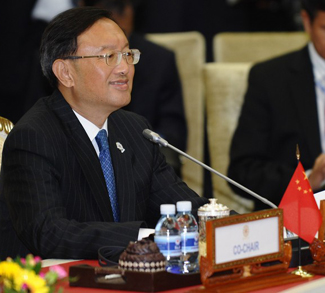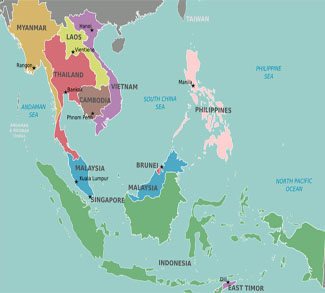Pressure Mounts on South Africa’s Jacob Zuma
Jacob Zuma has had his state of the nation speech postponed indefinitely amid growing calls for the embattled president to step down. The decision was made by parliament speaker Ms. Baleka Mbete, who pushed the president to postpone due to deteriorating decorum within parliament. In actuality, it likely has more to do with the African National Congress wanting to groom Deputy President Cyril Ramaphosa to take over for Zuma ahead of elections in 2019.
The postponement reflects the increasingly precarious position that President Zuma finds himself in.
No stranger to controversy, Zuma has been mired in scandal since coming to power in 2009. His political career has weathered supposed corruption involving a 1999 arms deal (the charges were dropped when he assumed presidential immunity in 2009), the construction of a lavish private home in Nkandla on the public’s dime (he eventually paid back the money), an uncomfortably close and very public relationship with the powerful Gupta family, and even accusations of raping a family friend in 2005 (he was found not guilty in 2006).
President Zuma has been South Africa’s answer to Washington’s own Teflon Don. However, there is reason to believe that his luck may soon run out. The ANC is still shaken by its defeat in local elections in 2016 – usually a ‘gimme’ for the party of Nelson Mandela – and many in the highest levels of the ANC leadership believe that Zuma’s considerable baggage could drag the party down in general elections scheduled for 2019.
Now the question becomes: Will President Zuma go quietly into the night? The ANC has already approached the 75-year-old to step down last week. He refused, and given the potential for old corruption allegations to be revisited after losing presidential immunity, it’s unlikely that Zuma will be changing his mind anytime soon. Now it’s up to the six-person ANC national executive committee to decide on the president’s future; two of its members are known Zuma supporters. Should the committee compel Zuma to step down, it wouldn’t be a first in South African politics – the same thing happened to former president Thabo Mbeki, who resigned a year ahead of elections in 2008 due to various scandals.
Poor economic performance remains the backdrop to the political drama unfolding within the ANC. IMF chief Christine Lagarde recently delivered a grim warning while visiting the country: “long-standing structural challenges continue to weigh on growth in South Africa… bold and timely reforms are needed to create an environment conducive to job creation and less inequality.” National unemployment remains stuck in the mid-30% range.
Philippines Watches as China Completes Militarization of Mischief Reef
China’s military build-up in the Spratly Islands is almost complete according to photos taken by a Philippine newspaper in December 2017. The photos reveal that China now has now completed military facilities on Fiery Cross, Calderon, Burgos, Johnson South, Mischief, Subi, and Hughes reefs – all seven of which were previously claimed by the Philippines, though these claims have not been raised since President Duterte came to power. The facilities include runways, helipads, barracks, and mounted guns. Earlier photographs have also revealed PLA Navy vessels being stationed at the reefs.
Although the revelations in these photographs don’t come as a surprise, they certainly underscore a sensitive aspect of the Duterte government’s foreign policy. Duterte came to power hoping that accommodation of China’s island-building program would pay off in terms of added investment and loans; he decided not to push the Philippines legal victory on ownership of Mischief Reef, which was announced two weeks into his presidency.
The deal was that Beijing would not reclaim any new artificial islands. And although the deepening militarization of its reefs technically doesn’t breach this deal, it still comes as a hard pill to swallow in some corners of the Philippine establishment.
A more interesting development appears to be unfolding off the east coast of the Philippines, where Chinese survey ships have been spotted around Benham Rise in 2016. Duterte initially responded somewhat forcefully to the sightings: “you go there and tell them straight that this is ours, but I say it in friendship.” However, more recently he has been accommodating toward Chinese research vessels operating in the area. The real estate in question is very strategic, and of massive interest to China, as it falls in China’s ‘second island chain’ – the outer band of the maritime buffer the PLA Navy seeks to establish around China.
Although it’s a long-shot given the lack of any credible justification for reclaiming land off of the Philippines’ northeastern coast, the strategic value of the territory suggests that Beijing might just try its luck so long as a pliable a leader reigns in Manila.
China Tells Pakistan to Boost Security surrounding CPEC corridor projects
An employee of a Chinese shipping company was shot dead in Karachi earlier this week in what is being viewed as a targeted assassination. It was not an isolated incident: two Chinese nationals were abducted from Quetta and killed by terrorists last year, and just two weeks before that a gunman killed 10 laborers working on a CPEC highway project in Balochistan.
The assassination prompted foreign ministry spokesman Geng Shuang to call for new measures to safeguard the security of Chinese institutions and personnel operating in Pakistan.
There are thousands of Chinese engineers, technicians, and managers working in Pakistan on some $45-billion worth of CPEC corridor projects. Some of these projects are being built in Pakistan’s tribal hinterland, making it one of the most dangerous frontiers in the entire One Belt One Road Initiative. Incidents like these should be monitored closely as they can impact public opinion in China; this latest assassination has been trending wildly on Chinese social media.




